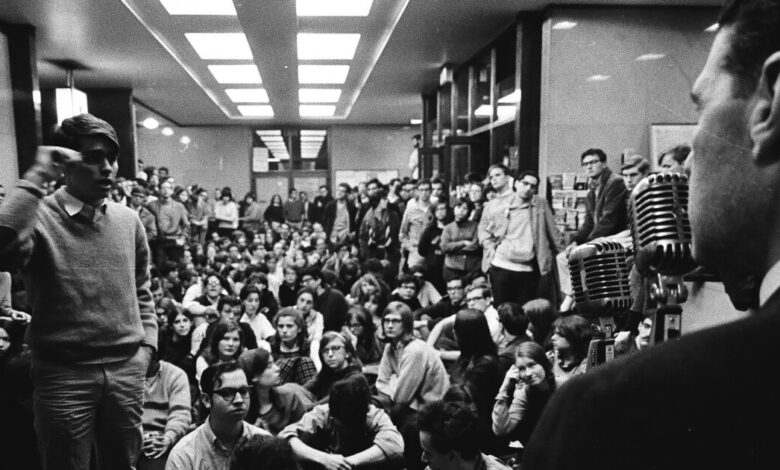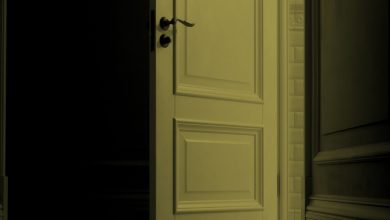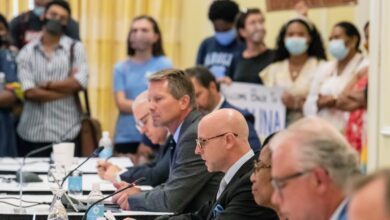Should College Administrators Take Political Positions?

[ad_1]
On June 24, Barbara K. Rimer, then dean of the public-health school at the University of North Carolina at Chapel Hill, posted a statement on the school’s website responding to the U.S. Supreme Court’s decision to overturn Roe v. Wade. She said that it was “a sad day” and that the court had “set the clock back 50 years.” For some, the dean’s words had crossed a line. The response came swiftly.
When college administrators support abortion rights or denounce structural racism through institutional statements, are they upholding the aims of academe to create a welcoming learning environment and improve society? Or are they aligning their institutions with a partisan political agenda and in the process muzzling contrarian viewpoints and shutting down robust classroom debates?
Board members, administrators, and faculty members are divided over whether their institutions — or units within them — should collectively speak up about controversial issues or stay silent.
In recent months, a handful of colleges, including the University of North Carolina at Chapel Hill, the University of California at Berkeley, and Princeton University, have reflected on, or declared their commitment to, a 55-year-old report crafted during a similarly contentious time in American history. The report is also cited in model legislation concerning free speech at public colleges that was proposed by a conservative think tank and has inspired laws in a handful of states.
The so-called Kalven Report, which was written in 1967 by a University of Chicago faculty committee, declared that the university should almost always remain neutral on political and social issues “not from a lack of courage nor out of indifference and insensitivity … [but] out of respect for free inquiry and the obligation to cherish a diversity of viewpoints.”
At about 1,150 words long, the report makes the case that the university “must sustain an extraordinary environment of freedom of inquiry and maintain an independence from political fashions, passions, and pressures. A university, if it is to be true to its faith in intellectual inquiry, must embrace, be hospitable to, and encourage the widest diversity of views within its own community.”
To some, the Kalven Report is a principled commitment to open debate. Others say it is an excuse to stand on the sidelines even when circumstances call for leadership and vision. Both sides claim they are defending academic freedom: Supporters of Kalven argue that institutional neutrality preserves the academic freedom of individuals, while critics counter that institutions, too, should be allowed to take positions.
Some faculty members and college trustees regard the Kalven Report as a cherished touchstone, articulating the rationale for colleges to take the courageous position of remaining neutral or even silent. They say the report should remind colleges of their core mission, “the discovery, improvement, and dissemination of knowledge,” not the shaping of politics.
Michael B. Poliakoff, president and chief executive of the American Council of Trustees and Alumni, said it’s especially important in the current political climate for colleges and universities to be sanctuaries for robust debate. “They need to foster that very special role that they have of being the place where people have the most unfettered freedom to exchange ideas,” Poliakoff said.
But critics of the Kalven Report, including some college administrators, say that remaining silent looks a lot like endorsing the status quo — convenient, perhaps, for those who have held positions of power for most of American history. They reject the report’s very premise and question its relevance today, arguing that college leaders should actively engage in the world around them.
“This notion that colleges can exist behind ivy-covered walls and not have to worry about or directly engage with political and social issues around them has never been right, but during periods when there are very strong challenges to things like academic freedom and academic inquiry, colleges are just kidding themselves,” said Brian Rosenberg, a visiting professor in the Harvard Graduate School of Education and president emeritus of Macalaster College. “You cannot escape politics. Your choice is to act as if you have no stake in those arguments or you can have a little more courage and actively engage in those debates.”
University leadership believed that not to comply with the Selective Service would be committing civil disobedience, according to Richard Flacks, then a sociology professor at Chicago. He was among a group of faculty members who argued, on the other hand, that to create a class ranking and share it with the government would be contributing to the war effort. According to the historian Ellen Schrecker, who has written about universities in the 1960s, Chicago decided to rank students but released individual rankings to the draft board only at each student’s request.
In January 1967, 200 students protested at the Continental Illinois National Bank to demand that it divest from South Africa. Days later, students gathered on the steps of the Administration Building to urge the university to stop doing business with the bank, according to John W. Boyer, dean of the college and a history professor at the University of Chicago, who wrote a book about the university’s past.
In the wake of those demands, President George W. Beadle appointed a faculty committee in February of 1967 to consider the university’s role in social and political action, to be led by Harry Kalven Jr., a law professor. By May, the committee had come to a consensus, concluding that to preserve the academic freedom of individuals, the institution must almost always refrain from taking positions.
The Council of the Senate adopted the Kalven Report the following month, with little dissent. Since then, Boyer wrote, the report has come to have “an almost canonical standing in the civic culture of the University,” which prides itself on its long history and tradition of freedom of expression, dating back to its founding.
More recently at the University of Chicago, in 2014, Robert J. Zimmer and Eric D. Isaacs, the president and provost at the time, responded to colleges elsewhere inviting and uninviting speakers to campus by asking Geoffrey R. Stone, a law professor there, to lead a committee to articulate a position for Chicago. The resulting guidelines, now commonly known as the Chicago Principles, were intended to supplement the university’s previous commitments to academic freedom, including the Kalven Report. They declare the university’s commitment to freedom of expression and a free and open discussion of ideas even when some of those ideas are considered by some to be “offensive, unwise, immoral, or wrong-headed.” That document has been adopted by more than 90 institutions, according to the Foundation for Individual Rights and Expression.
Stone said that, undoubtedly, some members of the university community would like the institution to take a position on Donald Trump or racism or abortion. “Chicago will never take a position,” Stone said. The assumption is that it’s up to the faculty and the students to debate the issues and reach their individual conclusions. “But the university should not be the Big Brother telling them what’s right and wrong,” Stone said.
But some say the university has not always succeeded in maintaining institutional neutrality. Flacks said that in the years preceding the Kalven Report, for example, one administrator helped write an urban-renewal law to aid the university’s efforts to redevelop the South Side of the city. In that case, Flacks said, the university not only made its opinions known but made a proactive, institutional commitment to changing the community. “This is not a minimal or small engagement policy,” he said.
Flacks believed the university’s “sanctimonious” position on institutional neutrality contradicted its actions. “I wasn’t persuaded that the Kalven Report was a sincere and honest assessment of this question,” said Flacks, who left Chicago for the University of California at Santa Barbara shortly after the report was adopted. “I thought it served more like a PR piece … to protect the university from criticism.”
In 2022, Republicans and Democrats in America are deeply divided on a host of hot-button topics, including abortion, climate change, gender identity, elections, immigration, and racism. Meanwhile, colleges are enrolling student bodies with greater racial and gender diversity than in the 1960s, and are expected to foster living and learning environments where all students feel welcome. All of that puts administrators in a precarious position, attempting to please multiple constituents with sometimes conflicting agendas.
In this context, the Kalven Report began cropping up in debates and conversations among scholars, administrators, and trustees looking for guidance. In prior decades, the debate was largely limited to whether college presidents should speak out. But today, deans and department chairs, for example, who now have access to departmental social-media accounts and websites, have been thrown into the fray.
The North Carolina law states that public universities may not take action on public-policy controversies in a way that requires students, faculty, or administrators “to publicly express a given view of social policy” and requires the universities to implement disciplinary actions against those who violate others’ free-speech rights, among other things. While supporters of the campus free-speech laws said they would help to combat censorship on college campuses, critics said the laws were overly broad and could chill all forms of protest.
This summer, amid a continuing controversy over academic governance and academic freedom at the university, UNC-Chapel Hill’s Board of Trustees adopted a resolution reaffirming the university’s commitment to academic freedom, citing the Kalven Report. Trustee Perrin W. Jones, a physician and former state legislator who proposed the resolution, said that before his appointment, he spent time thinking about what his goals and priorities would be, if he were named to the board. In particular, he read up on academic freedom and free speech. Somewhere in his self-assigned homework, Jones came across the Kalven Report, whose central message of institutional neutrality resonated with him. “I think that it ensures the alignment between the university’s purpose and its action,” Jones said. “I think it preserves the integrity of the university.”
Jones said that if UNC Chapel Hill were to take positions on issues, people in the community with different opinions might find their voices chilled. “I would like to see Carolina be a place that people can talk about issues freely, openly, and … maybe even somewhat heatedly, I guess, but recognize that at the end of the day, we’re all part of the same community and that we should respect one another’s views.”
Jones said he wanted to demonstrate the university’s commitment to academic freedom, following the lead of the university’s Faculty Council, which in 2018 adopted the Chicago Principles. “I’ll certainly say that there had been some questioning of the board’s commitment to the concept of academic freedom and institutional neutrality,” Jones acknowledged. “And this was a way … for us to affirm our commitment to those principles.”
But several months later, some faculty members are still questioning the board’s intent in adopting Kalven. Over the past several years, the university has been beset by a long list of controversies in which critics argue that its governance has become politicized and academic freedom threatened, if not compromised. As a result of these incidents, many faculty members were already on edge about what they could or could not say or teach.

Julia Wall, Getty Images
Eric L. Muller, a UNC law professor, is skeptical that the board’s resolution is designed to protect academic freedom. Muller believes he was not reappointed by the university system’s board to the university press’s board of governors because he has been an outspoken critic of the university system, including of its decision to pay the Sons of Confederate Veterans $2.5 million to care for Silent Sam, the Confederate statue that protesters toppled in 2018 (the deal was later invalidated by a judge).
“The university has had a number of opportunities over the past six to eight years to actually step up and defend the speech and expression rights of faculty members when it has come under attack, and the university has largely remained silent in those situations,” Muller said.
He is pessimistic about what the adoption of the Kalven Report means for Chapel Hill. “You have got a relatively conservative governing board that is telling a relatively liberal university that it should not be stating public positions on things,” Muller said. “An effect of this will be to keep the university from taking positions that the Board of Trustees doesn’t like.”
Mimi V. Chapman, chair of the faculty at UNC-Chapel Hill, is among the founders of the Coalition for Carolina, a group working to raise awareness about what it sees as inappropriate interference by the system’s and Chapel Hill’s boards in the university’s governance. Chapman said she hoped adopting Kalven wasn’t “a mechanism … for muzzling administrators but rather a mechanism for allowing faculty to bring their expertise, knowledge, and practice on the issues of the day to the public square.”
Jones, the trustee, said he doesn’t object to professors’ sharing their personal opinions and highlighting their academic credentials as a means to give them credibility on the subject matter. “I have no problem with that at all,” he said. “I think the line comes in where someone’s individual voice becomes mistaken for the voice of the university.”
But asked whether the board would try to restrict what professors might say about controversial topics such as abortion inside their classrooms, Jones deferred to the university’s academic leaders. “That would probably be better answered by the provost or the individual deans,” he said.
Barbara Rimer, the public-health dean, made her controversial statement about abortion rights before Chapel Hill’s board adopted the resolution citing the Kalven Report, but her action raised questions about institutional neutrality. Rimer posted the statement on June 24, less than a week before the date of her long-planned retirement as dean. But on June 27, Rimer’s statement was revised to correct a number and to address “some readers’ concerns about the original message.” The revised statement, according to the Wayback Machine internet archive, added that the views expressed in the message were Rimer’s alone and “do not represent the views and policies of the University of North Carolina or the Gillings School.” Rimer, who has since retired as dean, declined to comment.
The revision also removed the sentence “It is a sad day.”
The question emerged after staff, faculty members, and students posted statements on department web pages on topics such as Black Lives Matter and Middle East politics that could have been interpreted as departmental positions. For example, the Berkeley School of Public Health posted a statement condemning racism that said, in part, “Racism and white supremacy are our nation’s original sin, and a big reason for where we find ourselves at this moment in history.”
University leaders appointed a faculty committee in April to explore creating a policy on political speech by the university or its departments, suggesting the committee review the Kalven Report and similar statements.
A draft report of the working group finds that the Kalven Report remains relevant today but needs to be updated. The group endorses Kalven’s contention that a university should challenge existing conditions and advance new social models, for example. But where Kalven argues that “a good university, like Socrates will be upsetting,” the group calls for civility, respect, and debate to promote the value of shared inquiry, and urges the campus to create an inclusive environment without resorting to silencing or disrupting speakers. The draft report also calls on departments that choose to make statements on websites to follow a consistent policy for doing so that is not based on the views expressed.
Among the questions the working group considered is whether silence can be interpreted as support of the status quo. “This is something that I think people became very conscious of in the aftermath of George Floyd’s murder,” said Mary Ann Smart, chair of the Berkeley Division of the Academic Senate and co-chair of the working group. “People felt not to speak was to be complicit or to be upholding a status quo. I don’t know the answer to how you thread that needle — definitely case by case.” The group recently finished collecting feedback on the draft.
Those exceptions came under scrutiny last month at Princeton University, where the James Madison Program in American Ideals and Institutions held a conference on the Kalven Report. About 40 faculty members, students, and other guests gathered in a classroom to watch two panels of academic-freedom experts discuss the importance of the report and its legal implications. Following the panels, guests were invited to a closed-door session to consider the possibility of updating the Kalven Report for Princeton to adopt.

Drew Angerer, Getty Images
The panelists generally agreed that colleges should avoid taking institutional positions in order to preserve the academic freedom of individual faculty members and students. But some of the conversation focused on how broadly to interpret the exceptions identified in the Kalven Report. It specifically mentions the awarding of honors as an allowable exception to strict neutrality, for example, but one panelist questioned whether universities should award honorary degrees, for example, at all. Another asked whether the principle of institutional neutrality should be modified depending on the mission of the institution, such as in the case of a historically Black college.
Those who attended the closed-door session decided it would not be worth the effort to try to update the Kalven Report — in part because it so effectively articulates the rationale for institutional neutrality — but said they would continue to talk about related issues, according to Keith E. Whittington, a professor of politics at Princeton and one of the organizers of the conference.
Separately, Christopher L. Eisgruber, Princeton’s president and a constitutional scholar and graduate of the University of Chicago Law School, recently tasked a faculty committee with considering whether Princeton should have a policy on academic or administrative departments’ taking positions on issues.
Eisgruber said that he admires the example set by former Princeton president Robert F. Goheen, who led the university through the turbulent 1960s. When students invited Ross Barnett, Mississippi’s segregationist governor, to speak on campus in 1963, Goheen defended his right to speak but also condemned the invitation, saying it conflicted with the university’s commitment to “the fair and equal treatment of all persons.”
Eisgruber wrote recently in the Princeton Alumni Weekly about Goheen and the university’s tradition of institutional restraint, a term that he credited to former President William G. Bowen. Eisgruber said in an interview that Bowen thought institutional restraint was more appropriate than institutional neutrality because universities are value-laden.
It was the position of institutional restraint, Eisgruber said, that allowed Princeton to recently become the first U.S. university to reject financing, including research funding, from much of the fossil-fuel industry. Strict institutional neutrality would not have allowed that decision.
“Even the commitment to free speech … and the commitment to equality and excellence and vigorous inquiry that we’ve been talking about — all those things are values,” Eisgruber said. “They’re not just neutral. They require commitments, they require advocacy, they require action, they require people leaning in.”
[ad_2]
Source link






